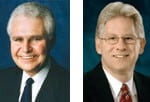My 30 years in utility regulation have coincided with an immense increase in issue complexity, and a commensurate expansion in the roles and responsibilities of the regulator.
In the late 1970s, utilities built infrastructure, served customers, made rate requests. Commissions approved projects and set rates. Asked at a dinner party, “What do you do?” a regulator could answer with a single sentence: “We protect customers from monopoly abuse—from inefficiency, sloth, cost overruns, excessive rates.” Consumers were passive, at-risk individuals, lacking options, needing protection.
Today, that consumer protection role has fallen to near-footnote status. Regulators are market makers, infrastructure planners, investment fund collectors and managers, renewable energy incubators, merger reviewers, broadband promoters, energy efficiency programmers, even auctioneers. They host interest group gatherings, resolve stakeholder differences, even act as political shields for executives and legislators paralyzed by the complexity of it all.
To keep track of these roles, let alone excel in them, will require each of Gardner’s five minds [Howard Gardner, Five Minds for the Future (2008)]. Let’s start with the disciplined mind.
According to Gardner, “The future belongs to those organizations, as well as those individuals, that have made an active, lifelong commitment to continue to learn. People unable to engage in disciplined thought may sport trendy dress and use up-to-date argot, [but] they are essentially stranded in the same intellectual place as barbarians.”
“Those who do not have a discipline, as well as a sense of discipline, either will be without work or will work for someone who does have a discipline,” Gardner wrote. Regulatory success requires both mastering a discipline, and being disciplined. What do these concepts mean?
Mastering the Discipline
“Neither teachers nor students nor policymakers nor ordinary citizens sufficiently appreciate the differences between subject matter and discipline,” Gardner wrote. What is the “discipline” of regulation? What distinguishes it from a series of facts about engineering, economics, accounting, finance, law and management; from the subject matters of electricity, gas, telecommunications, and water?
Each of these subject areas is its own discipline, contributing its insights to the regulatory decision-maker. But the discipline of regulation is not merely the sum of these other disciplines. Regulation has a distinct purpose: to induce high-quality performance from entities that, absent regulation, would perform suboptimally.
The discipline of regulation requires mastery of the motivations and forces that cause this diversion of private performance from public interest. These diversions call for regulation but also define its proper boundaries, for private behavior aligned with public good needs no regulator.
The disciplined regulator therefore focuses on forces that undermine optimality. She understands that sales can increase profits but cause environmental costs, that acquisitiveness can increase scale economies but weaken competitive markets, that technology can excite innovation but distract from the mundane (broadband and smart grid are exciting, but plenty of Americans still depend on wirelines); that dispersed responsibility diminishes accountability (if we replace a vertically integrated utility with separate generators, efficiency suppliers, transmission providers, and “wires” operators, whom do we sue when the lights go out?).
Mastering the discipline of regulation requires anticipating and appreciating the changing roles of consumers and utilities. Consumers are no longer mere protectees. They are actors: they demand quality of service and choice of services; they also engage in behaviors that, unregulated, cause problems for others—like the over-consumption that causes their children to pay for the parents’ pollution. To define the regulatory purpose as “protecting consumers” both insults their intelligence and disregards the damage they can cause.
Utilities have new roles, too. They used to control the markets they served and the assets they needed to serve. Now their telephone, gas, and (in some states) electricity customers can come and go, self-generate, cut their usage or drop off the system entirely, all while insisting on a right to return without penalty. As for assets, though regulated industries are still mostly “network” industries, the network assets are owned, controlled, and used by multiple entities.
Utilities confront this instability in different ways. Some use their captive customer base to acquire new territories or finance new ventures. Some shed less profitable activities in favor of new products. Some seek market protection through the political process. Some are inert: novelist and poet John Dos Passos wrote, “Apathy is one of the characteristic responses of any living organism when it is subjected to stimuli too intense or too complicated to cope with.”
The discipline of regulation, then, requires more than mere awareness of these facts. Discipline depends on purpose: aligning the behaviors and performances of actors and assets with the public service obligation. Mastering the discipline of regulation requires asking the right questions. The right questions are not, “Are you for or against decoupling?” or, “How do you feel about smart grid?” or, “Should we approve this merger?” The right questions are: “What actions must the utility take to carry out its general obligation to serve the public at reasonable cost?” and, “What actions must regulators take to induce those actions and compensate appropriately?”
Being Disciplined
“An individual is disciplined to the extent that she has acquired the habits that allow her to make steady and essentially unending progress in the mastery of a skill, craft, or body of knowledge,” says Gardner. Having entered the discipline of regulation, what then does the disciplined regulator do? My suggestions:
(B) To avoid intellectual ruts and error repetitions, identify one’s knowledge gaps—knowledge gaps about technology, legal developments, jurisdictional boundaries, corporate motivations, and customer behavior. The key words here are humility (the state of realizing that one knows less than one should) and curiosity (the state of wanting to know more than one does).
(C) To salvage one’s ability to think independently, avoid the distractions, like one more plane trip to one more stakeholder-dominated conference, in favor of daily blocks of quiet reading and study time.
There cannot be discipline without self-criticism; there cannot be self-criticism without humility and confidence. Humility and confidence, seemingly in conflict, are in fact interdependent. Confidence comes, circularly, from experiencing the self-improvement that comes from self-criticism, which in turn depends on humility.
Regulators, and regulation, have experienced all these phases. Even the rare regulator with many years’ experience finds the swirl of statutes, case law, engineering limits, and innovation options humbling. Imagine the reaction of new regulators (who continuously constitute the supermajority of state decision-makers) to their revenue requirements spreadsheet, whose cells have 10 digits.
Self-criticism comes, we hope, after experiences like the billion-dollar cost overruns of nuclear power’s first era, and the billion-dollar clean-up cost we now face from our fossil dependence. In these two cases, the self-criticism must be more institutional than personal, since nearly all of the individuals responsible for these regulatory errors left their posts decades ago.
Given these experiences, decisional overconfidence should be in short supply, replaced with confidence in our ability to respond skeptically to those offering easy answers. That skepticism is essential for independence, for, as Gardner writes, people unable to engage in disciplined thinking “are completely dependent on others when they must make decisions about their own health and welfare or vote on issues of importance for their time.”
—Scott Hempling, a regular contributor to MANAGING POWER, is executive director of the National Regulatory Research Institute, based in Washington, D.C. Reprinted with permission from NRRI.









